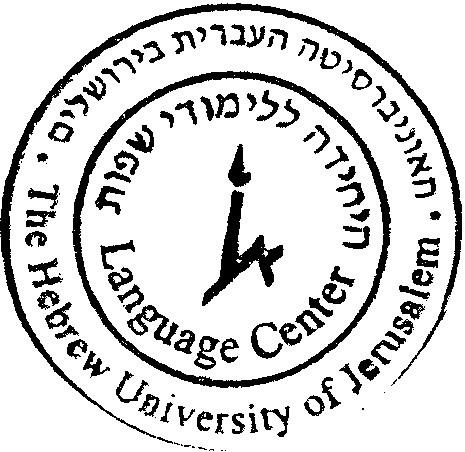Our Mission
The Language Center of the Hebrew University aims to equip its learners with a wide range of communicative and intercultural competencies; to trigger curiosity through languages and to foster plurilingualism; to establish a positive and supportive learning environment; to maximize learning by engaging our students and facilitating learner autonomy; and to encourage authentic dialogue between social agents living in a complex reality, here in Jerusalem.
The following provides a brief description of some of the guiding principles adopted in our current approach to language learning, in keeping with the CEFR:
Ends and means – we do not treat language as an end in and of itself but rather as a means of communication: for gathering information, exchanging ideas, joining the conversation and mediating, at every level – personal and professional , and generally broadening one's horizons. Therefore, we shy away from testing comprehension or structures as such; rather, we try to create authentic situations for meaningful exchange, making intensive and dynamic use of the language a necessity rather than an answer to a question formulated by a teacher. Written communication is treated similarly, as the reader and writer negotiate meaning in what can be viewed as asynchronous dialogue.
Use of the target language – functioning in the language itself, from day one, is highly beneficial to learners; rather than memorizing linguistic elements or literally translating into the mother tongue, the language, with all of its nuances, is gradually internalized and the learner slowly begins to feel like an insider. Simplified language does not limit communication to simplistic ideas; our "can do" learning outcomes (per level) place emphasis, for instance, on the ability to paraphrase or illustrate one's ideas to compensate for linguistic gaps.
The learning process – deciding to take on the challenge of acquiring an additional language is an all-encompassing process not limited to contact hours in the classroom. Learners are actively encouraged to come in contact with the target language and its speakers in every way possible, including through Tandem language exchange on campus. Students are asked to take charge of their own learning, and we offer specialized advising to language learners in order to develop awareness to learning processes an develop personalized learning plans.
Teacher as facilitator – our teachers do not cover course "material"; instead, they facilitate the processes of learning described above. The teacher creates maximum opportunities, provides tools, and offers pointed feedback, encouraging learners to monitor and reflect on their own learning processes rather than providing them with ready-made solutions or corrections. Therefore, "learning how to learn" is integral to our course objectives.
Attitude towards errors – emphasizing what one cannot do is detrimental to learning. Therefore, we adopt a benevolent approach whereby understanding and being understood in the target language is an achievement in its own right even when errors are present. Linguistic accuracy is not treated as an ideal; it is viewed pragmatically – it affects comprehension, appropriateness, politeness, one's credibility, and so forth. Feedback addresses these aspects to improve context-appropriate intercultural communication.
Intercultural communication– language is treated in the broad sense as an expression of culture in all of its complexity, taking into account that of course not all speakers of a given language share the same culture. We select textbooks and teaching materials that view language as a portal to culture, to inter-cultural awareness and empathy, and to diversity among speakers of the target language and its variations. Great attention is devoted to cultural codes, to indirect modes of communication, and to appropriate and effective communication in nuanced contexts.
Mediation – this concept, highlighted especially in the recent addition to the CEFR (2020), emphasizes what we often "do" with the input we receive via interaction in the language: interpret, report to others, adapt for use in other contexts, bridge conceptual gaps between people from different backgrounds, and so forth. Ultimately, at the native speaker level, a central aspect of mediation could be expressed as: "I can mediate effectively and naturally between members of my own and other communities, taking account of sociocultural and sociolinguistic differences and communicating finer shades of meaning." Such abilities are then reverse-engineered and broken down into level-appropriate capabilities, as early as A1 beginner courses.
Academic skills – since our courses begin at level A1 yet with long-term academic goals in mind, the seeds for higher order analysis and expression, critical thinking and common academic norms are sown from the start. Engaging with challenging subject-matter and discussing issues that trigger opinionated responses make even our beginner courses meaningful and rewarding for students in higher education. Through developing learner awarenss we aspire to provide an appreciation of how our learning spiral deeply and systematically builds toward functioning in the target language in professional settings.
Welcome to the Hebrew Universtiy Language Center!
Chaya Fischer
Director

